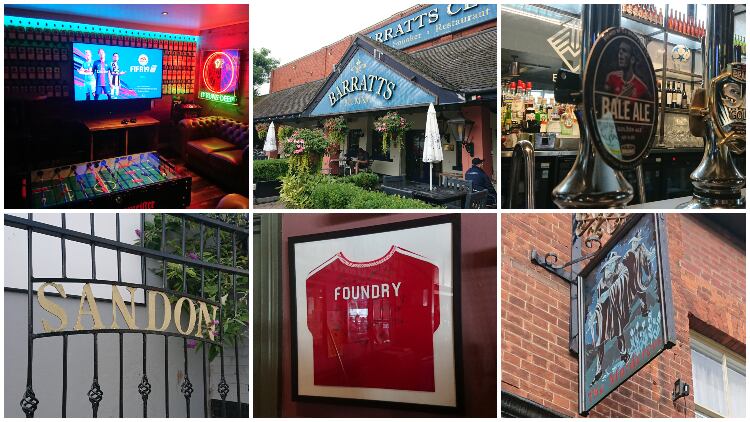While going on the road may not be the conventional thing for most pub operators to do, this is a great way of getting noticed nationally and treating diners across the country to your delicious dishes.
Gastropubs from across the country already showcase the best of their fare at celebrity chef Tom Kerridge’s now annual event – Pub in the Park.
At the most recent event, held in Tunbridge Wells, Kent, the team from Kerridge’s Hand & Flowers in Marlow, Buckinghamshire, served a minted lamb pie with mash and liquor; Kerridge’s fried chicken with ranch dressing and pickled slaw; and smoked hog taco with barbecue pineapple and sweetcorn salsa.
Current number one Estrella Damm Top 50 Gastropub the Sportsman in Seasalter, Kent, offered truffled macaroni cheese; honey and mustard glazed pork ribs; and spicy chicken wings.
The Tanner brothers-owned Kentish Hare in Tunbridge Wells had a plethora of dishes on offer at the event. This included its Hot Diggity Dog – Merguez sausage, ranch dressing, slaw, crispy onions and chives.
It also had a crispy monkfish taco, consisting of monkfish in a flour tortilla with green salsa, lime, coriander and sour cream. Guests could also feast upon Panzanella – smoked chicken, heritage tomatoes, bread, onion, basil, olive oil, vinegar and capers.
For its vegetarian offer, the pub had a tomato Panzanella salad and for vegans, a char-grilled summer courgette tortilla.
Fellow Kent pub – the Compassess Inn, Crundale – had three dishes on the menu including confit lamb brioche bun with wild garlic pesto; crispy ox cheek with caramelised miso mayonnaise and bacon crumb; and smoked haddock kedgeree pasty with curry ketchup.
Guest nights
In fact, this isn’t the first time top chefs have teamed up with fellow culinary experts because, often, they host guest nights in their pubs.
One example is the Freemasons at Wiswell, near Clitheroe, Lancashire, which hosts an annual East Meets West dinner where the pub’s chef-patron Steven Smith collaborates with guest head chef Victor Yu from the highly acclaimed Yu Alderley Edge in Cheshire.
It sees the two chefs fusing their culinary talents and styles together to produce a five-course journey through the food history of Chinese and British cuisine, using the freshest and finest ingredients.
The pub also hosts other special guest chefs, including Michelin-starred Michael Wignall of the Angel at Hetton, in North Yorkshire, which has just 18 covers where guests are treated to a sixcourse signature menu.
Pairing with fellow chefs is one way of expanding your business across the country but if you want to go alone, High Speed Training content production manager Louise Petty advises pubs on how to start a street food business, giving operators the opportunity to make their kitchen a national operation.
The training provider manager says: “Starting a street food business can be daunting, but what new business venture isn’t? The internet is a great platform on which to learn the core aspects of starting a food business. With so many online training courses now available, anyone can harness their catering and creative talents and begin their career as the next celebrated Levi Roots.
“Sourcing money to start your business can be one of the hardest parts when starting out. Some people choose to fund it entirely themselves, but this approach can be unreliable. Approaching the bank for a loan is the most trusted way or sharing the cost with a business partner will take off some of the strain.
“In the first months of your business, you might find that you won’t be taking home any salary. This is a standard in any new business venture.”
Petty also highlights why a strong and unique name and identity helps your brand stand out from competition.
“It creates a lasting impression upon your customers, and it is what people will see everywhere – such as on your transport or stall, your menus, your social media and online. Your brand identity should communicate your vision and be truly reflective of what you wanted your business to be,” she says.
Pop-up, pop-in
Training provider High Speed Training outlines top tips on marketing a new street food business:
- Advertising in magazines/newspapers, issuing a press release or doing an interview
- Word of mouth
- Business Cards
- Letterheads
- Creating a website
- Handing out leaflets and free samples – such as on the street or at food festivals
- Securing a slot at a food festival – take your business on tour!
- Social media; the world wide web and its many social platforms is a great place for marketing
Trade registration
From branding to legalities, she also lists all businesses a new company will need to register with in order to trade.
Petty adds: “Register with your local authority – you must register business at least 28 days before you start trading, with the environmental health department at the local authority closest to where your business will be based. Once you have registered, an environmental health officer (EHO) will come to inspect and certify that your vehicle or stall is in line with current regulations. They will also advise you on matters such as food labelling and allergy information.
“You need to register your street food business with HM Revenue and Customs (HMRC), so all taxing and personnel information is correct. It is also the law that all caterers must have employers’ liability insurance, which covers you for everything health and safety related for you and your employees.
“All gas-powered equipment used for catering purposes, must be installed, inspected and tested annually by a gas safe engineer. You must get all electrical equipment PAT tested every 12 monthsby an electrician, which ensures its safety and proves that you are ensuring a safe environment for you and your staff.”
However, operators who already serve food at their pub will know there is more to trading than ticking the boxes for equipment.
They also need to ensure they are compliant when it comes to food hygiene through the star rating system.
Petty says: “Food safety regulations state that anyone responsible for handling and selling food must ensure that the food they sell is safe to eat. Of course, this applies to all street food traders and the easiest way to prove that you are complying with the regulations is to take an online food safety training course that covers all the essential things you need to be food-hygiene savvy. Training should then be refreshed every three years to ensure that you keep up to date with any changes in the law or food safety practices. It’s easy to find an up-to date online course.”
Operators also need to take risk assessment into account when setting up a new street food business.
“Known as the Hazard Analysis Critical Control Point (HACCP) control system, all street food businesses should also complete a risk assessment to ensure that there are no food safety hazards and that working conditions are safe and suitable,” she adds.
“The Food Hygiene Rating Scheme (FHRS) is a Government and Food Standards Agency (FSA) scheme to help show how important good food hygiene practices are within a catering business.
An FSA officer will give you a rating from one to five depending on how you hygienically handle your food, the condition of your premises and kitchens, and how you log and manage all your food safety procedures.”




